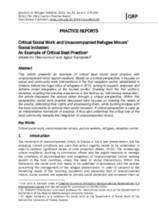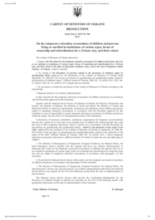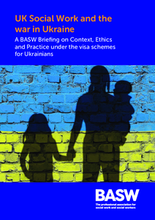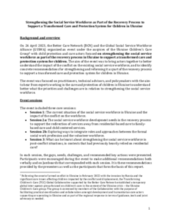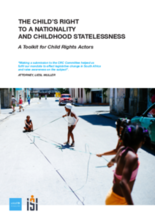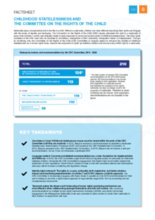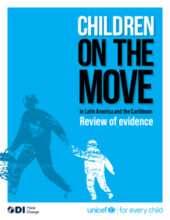Displaying 41 - 50 of 496
This article presents an example of critical best social work practice with unaccompanied minor asylum seekers. Based on a critical perspective, it focuses on social and community work interventions in the first reception centre, established in Greece, before the huge influx of refugees in 2015, aiming to support, empower and achieve social integration of the hosted youths.
This Procedure determines the mechanism of safety of the children and persons living or enlisted on the round-the-clock stay in organizations of different types, patterns of ownership and subordination (further - children and persons), during warlike situation by acceptance in case of need died to their temporary movement (evacuation), ensuring placement, proper leaving, education, and also return in the place of their permanent residence (stay), and in case of departure out of limits of Ukraine - to Ukraine.
The focus of this document is to support, inform and empower social workers across the UK in their ongoing practice and consideration of issues that arise in relation to people arriving and staying under the UK Ukraine visa schemes.
Maud de Boer-Buquicchio, CHIP President, discusses the measures in place to ensure that the many children that crossed the Polish/Ukraine border alone travelled with identity documents that would allow them to access child protection measures as they proceed on their journey.
On 26 April 2023, the Better Care Network (BCN) and the Global Social Service Workforce Alliance (GSSWA) organized an event under the auspices of the Ukraine Children’s Care Group with child protection and care actors focused on strengthening the social service workforce as part of the recovery process in Ukraine to support a transformed care and protection system for children. The event brought actors practitioners, technical advisors, policymakers and donors together to better understand the impact of the conflict on the existing social service workforce, and to identify concrete recommendations for strengthening and reforming it as part of the recovery process to support a transformed care and protection system for children in Ukraine.
On 26 April 2023, the Better Care Network (BCN) and the Global Social Service Workforce Alliance (GSSWA) organized an event under the aus
This study comprises ‘multiple elements including practical tips on how to meaningfully engage with the Committee on the Rights of the Child on childhood statelessness, complemented by a checklist, template and guidance note on how to make submissions’.
This document includes useful graphic information, ‘analysing CRC Committee recommendations on the child’s right to nationality and the protection of stateless children, capturing a snapshot of progressive engagement by the Committee on these issues between 2010-2020’. The factsheet is a brief and very useful document for all actors wishing to engage with the CRC Committee.
During this webinar, participants explored the dynamics of migrant child labor in the United States. Will efforts to “crack down” on child labor stop exploitation? How will forthcoming changes to U.S. asylum processes impact migrant children and their livelihoods? Most importantly, what do migrant youth have to say about their experiences?
This report aims to synthesize recent evidence concerning the experiences and needs of children affected by human mobility in Latin America and the Caribbean, and on how far programmes and policies are meeting those needs. It is motivated by a desire on the part of the United Nations Children’s Fund Latin America and Caribbean Regional Office (UNICEF LACRO) to promote proven responses to human mobility that genuinely respond to the needs of children and families: in their communities of origin, in transit, as they settle in new countries, or if they return to their countries of origin.

